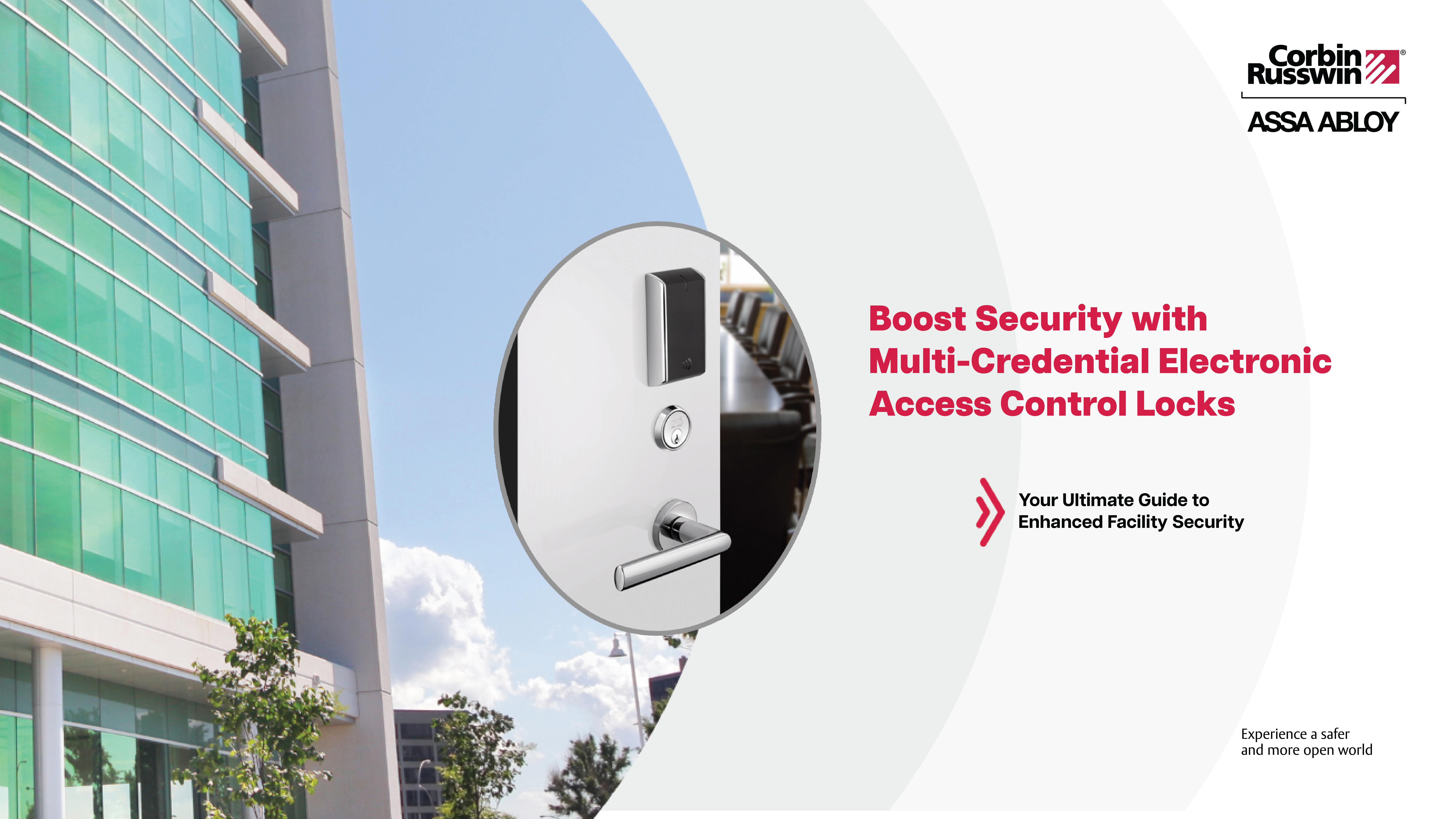Boost Security with Multi-Credential Electronic Access Control Locks
Upgrade your security with Corbin Russwin's multi-credential EAC locks. Enjoy the flexibility of cards, mobile, and PIN codes for enhanced protection.

Electronic Access Control (EAC) systems have transformed how we secure our spaces, replacing traditional keys with advanced digital solutions. At the heart of effective EAC systems lies flexibility. By supporting a variety of credential technologies, EAC systems offer unparalleled security and convenience.
From keycards to mobile credentials, multi-credential compatibility empowers organizations to tailor access control locking systems to their specific needs. This adaptability not only strengthens security but also enhances the user experience.
Here, we'll examine the strengths of the four primary credential types supported by these sophisticated locking systems.
Physical Credentials
Physical credentials such as smart cards or key fobs are one of the most traditional and widely used forms of access control. These cards are embedded with electronic chips that communicate with the access control system to grant or deny entry. Physical credentials are ideal for environments where users need a dedicated access device, such as manufacturing facilities or warehouses. The benefits include:
- Ease of Use: Physical cards are familiar and straightforward for users to carry and manage.
- Durability: Modern smart cards are built to withstand daily wear and tear, ensuring long-lasting reliability.
- Widely Adopted: Many organizations already use card-based systems, making integration with existing infrastructure seamless.
Mobile Credentials
Mobile credentials leverage smartphones and other mobile devices to enable access. By using Bluetooth, NFC, or QR codes, mobile credentials provide a modern and highly secure method of authentication. Mobile credentials are perfect for situations where on-the-go access is necessary, such as for sales teams visiting customer sites, remote workers accessing secure networks, and university students navigating campus facilities. From convenience to remote management, this type of credential offers several benefits.
- Convenience: Users are less likely to forget or lose their smartphones compared to physical cards.
- Enhanced Security: Mobile credentials can be protected with additional layers like biometrics (fingerprint or facial recognition) and strong PINs, adding a significant security boost.
- Remote Management: Administrators can easily issue, revoke, or update credentials remotely, simplifying access control across multiple locations.
Keypad-Based PIN Code
Keypad-based PIN codes offer a simple and effective method of access control. Users enter a pre-assigned PIN code on a keypad to gain entry. Keypad-based PIN codes are suitable for high-traffic areas where speed and convenience are essential, such as office buildings or educational institutions. PIN code credentials bring simplified accessibility and flexibility to users while maintaining security.
- No Physical Token Needed: Users do not need to carry any additional items, reducing the risk of lost or stolen credentials.
- Flexibility: PIN codes can be easily changed or updated as needed, providing an additional layer of security.
- Accessibility: They’re ideal for situations where issuing physical cards or mobile credentials is impractical.
Multi-Credential Access
Combining physical cards with PIN codes, for example, creates a multi-factor authentication (MFA) system that significantly enhances security. This method requires users to present their card and enter a valid PIN code. Multi-credential authentication is ideal for data centers, server rooms, and other highly sensitive areas.
- Increased Security: MFA significantly strengthens security by requiring two credentials for access.
- Versatility: This method can be tailored to specific security needs. High-security areas can require both a card and a PIN, while lower-security zones might allow single-credential access.
- Compliance: MFA systems help organizations adhere to strict security regulations by providing robust authentication mechanisms.
Credential Types and Compatible Corbin Russwin Locks
By supporting a range of credential technologies, Corbin Russwin's Electronic Access Control locks offer comprehensive solutions that cater to diverse security requirements. This flexibility not only enhances security but also improves the user experience, making it easier for organizations to manage access control effectively.
Incorporating multiple credential technology options ensures that EAC locking systems remain adaptable to emerging security challenges and technological advancements. Whether through the simplicity of physical cards, the convenience of mobile credentials, the practicality of keypad-based PIN codes, or the enhanced security of multi-credential systems, organizations can select the most appropriate methods to safeguard their facilities.
Ready to upgrade your security with Corbin Russwin's multi-credential EAC locks? Explore innovative EAC locks here.
Contact us today to learn more about our locking solutions and how we can help you create a more secure environment.